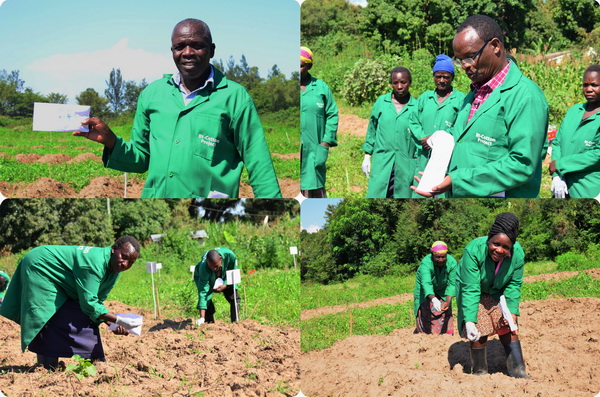
Kenya Starts Planting Biotech Cotton Under National Performance Trials
June 13, 2018| |
Kenya is one step away from commercializing Bt cotton following the commencement of National Performance Trials (NPTs) to identify suitable varieties for different agro-ecological zones. This comes after the National Environmental Management Authority (NEMA) granted an Environmental Impact Assessment license to Kenya Agricultural Livestock and Fisheries Organization (KALRO) to undertake the trials.
The planting began on June 11, 2018 in Kisumu, western Kenya, with KALRO's Bt cotton Principal Investigator, Dr. Charles Waturu, presiding over the event. The NPTs will be carried out in seven sites spread across six counties. GM cotton planting is a significant move in the revitalization of textiles and apparel industry, which the Kenyan government has identified as key in upscaling manufacturing and realizing the ‘Big Four' agenda, a five-year ambitious economic recovery plan. More than 200,000 hectares are earmarked for Bt cotton.
Speaking at the event, Dr. Waturu said he is optimistic that the data obtained from the trials will be adequate to allow Bt cotton varieties to be registered in Kenya, "I believe the NPTs will give way for commercialization of the GM crop," Dr. Waturu remarked. "If well-managed, farmers will be able to get up to five tons of cotton from one acre. This is a big boost and we want to move fast to ensure Kenya regains her cotton growing glory," he added.
The beginning of the NPTs is a relief for thousands of cotton farmers in the country who are excited that they will reap big from Bt cotton once it is commercialized. "We are excited that today marks the beginning of an end to our woes as Bt cotton will significantly reduce exposure to harmful pesticides, boost our cotton harvests, reduce cost of production and increase our income so that we can afford quality education for our children," said James Midega, a local cotton farmer.
If the trials yield favorable data, farmers are likely to access the Bt cotton hybrid seeds in April 2019. This will be a culmination of a process that started in 2001 when the first application to introduce Bt cotton was made. The first transgenic cotton confined field trials were planted in 2004 and completed in 2010. An environmental release approval by the National Biosafety Authority followed in 2016, subject to meeting some conditions among them, Environmental Impact Assessment (EIA) clearance certificate. NEMA issued the license for implementations of the NPTs on May 30, 2018.

For more on biotech cotton in Kenya, contact Dr. Charles Waturu at waturucharles@gmail.com and karithikaa12@gmail.com.
| |
Biotech Updates is a weekly newsletter of ISAAA, a not-for-profit organization. It is distributed for free to over 22,000 subscribers worldwide to inform them about the key developments in biosciences, especially in biotechnology. Your support will help us in our mission to feed the world with knowledge. You can help by donating as little as $10.
-
See more articles:
-
News from Around the World
- FAO Lists 20 Tools for Transforming Food and Agriculture to Achieve SDGs
- Kenya Starts Planting Biotech Cotton Under National Performance Trials
- USDA APHIS Seeks Comments to Deregulate GE Cotton
- Marketing Experts Study Why Consumers Don't See the Benefits of GM Foods
- SABC & ICRISAT Discuss PPP in Agricultural Research, Technology, and Innovation in India
- Plants Help Offspring by Passing on Seasonal Clues
- Speeding Up Photorespiration Boosts Crop Production by 47%
- Genetically Engineered Rice Transports Micronutrients More Efficiently
-
Research Highlights
- PvTRX1h Gene Involved in Regulation of Nodules in Common Bean
- TaPSTOL Controls Agronomically Important Traits in Wheat
-
Beyond Crop Biotech
- Kenyan Stakeholders Advocate Harnessing Innovations in Biotech to Curb Plastic Pollution
- AU Launches Report on Emerging Technologies Expected to Spur Africa Development
-
Announcements
- 3rd World Biotechnology Congress
-
Resources
- Bt Eggplant Videos
-
Plant
- Use of Tomato Promoter Increases CRISPR-Cas9 Efficiency
- OsSLA4 Plays a Role in Chloroplast Development in Rice
- CRISPR Confirms Candidate Gene for Flag Leaf Size in Rice
- Researchers Find Potential Fusarium Wilt Resistance Gene in Tomato
-
Read the latest: - Biotech Updates (January 21, 2026)
- Gene Editing Supplement (January 28, 2026)
- Gene Drive Supplement (February 22, 2023)
-
Subscribe to BU: - Share
- Tweet
